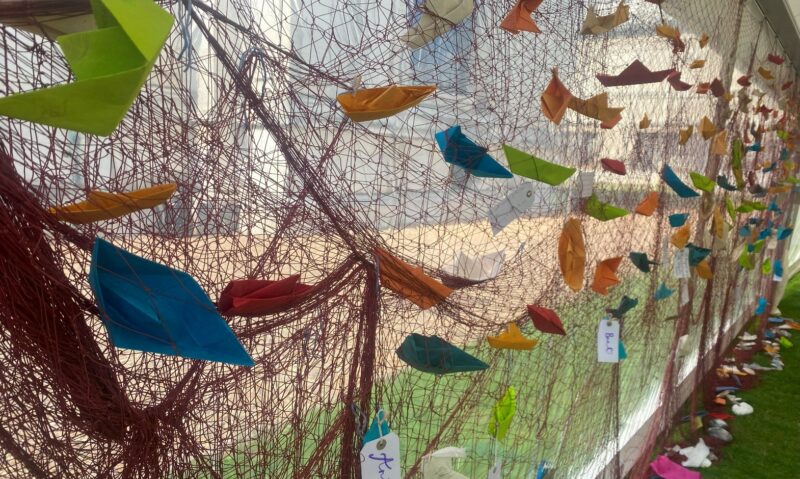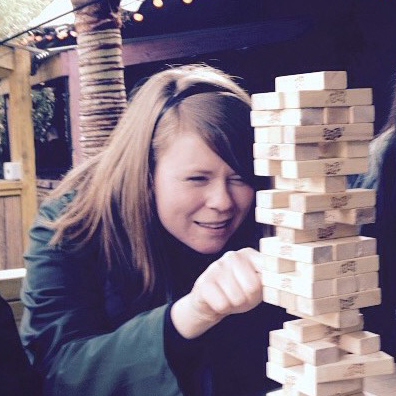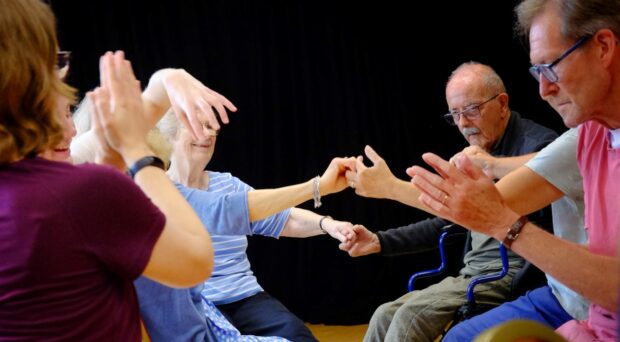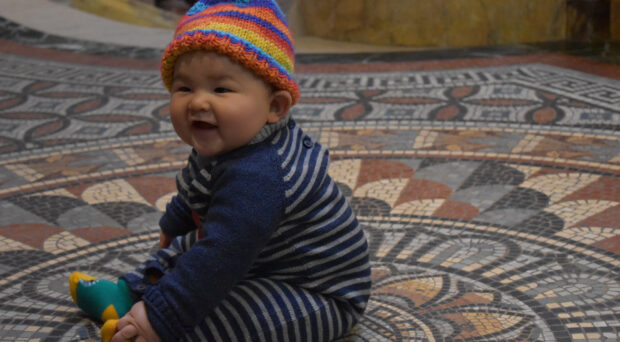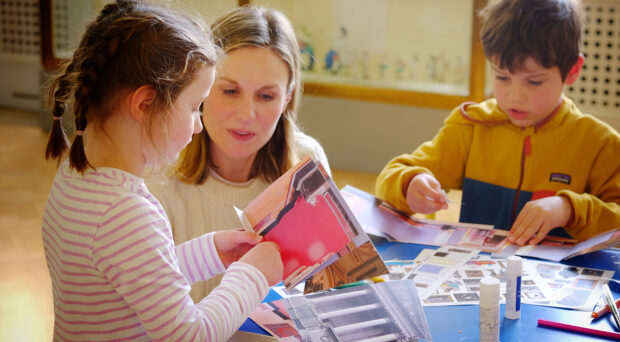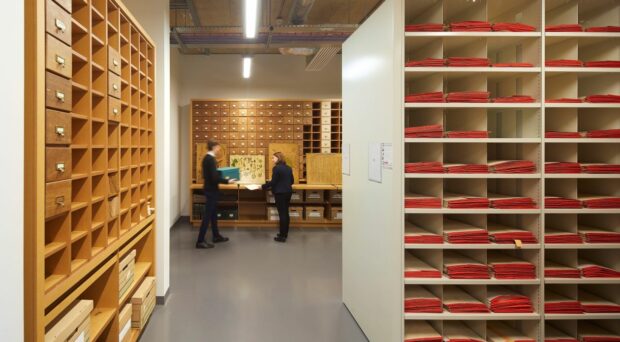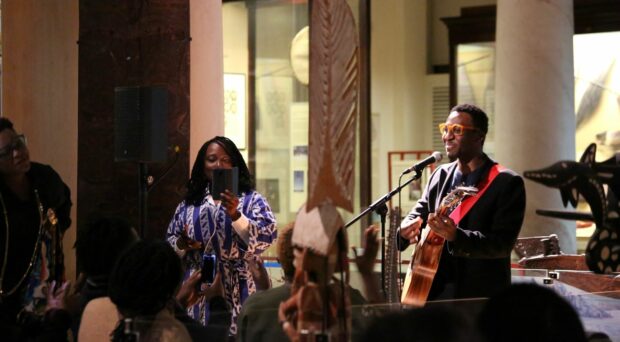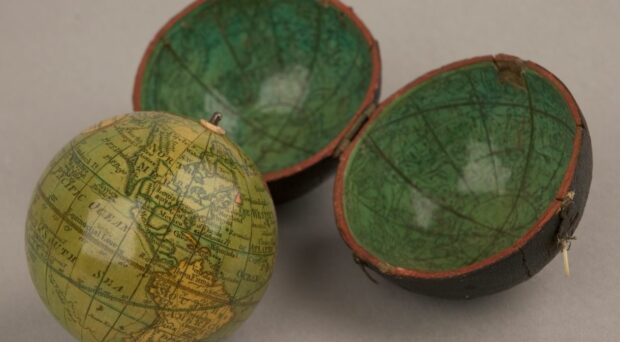Over the last 18 months the UCM Partnerships team have been working to explore the theme of Power and Memory across the consortium. One initiative we knew we wanted to try very early on was an ‘Open Call’ process – inviting community organisations and local creatives to suggest ideas for events and activities that the museums could help make happen collectively in their public spaces. We felt that inviting ideas from community contacts and interested external parties was very in keeping with the ethos of themes linked to the wider Power and Memory programme:
- Why should we always decide how our spaces are used for public activities?
- Could we give up a bit of power in our public events programmes?
- Could others use the platforms with communities and audiences that the Museums have to focus on the issues and ideas they want to share?
- How do people outside of our bubble interpret the themes of Power and Memory in the context of our Museums, and also our city?
It’s fair to say that we learnt A LOT about inviting a process like this across so many collections in the consortium. So much so that we decided to write a blog about it! Some of the ideas suggested during the Open Call are still in the process of being realised (which gives you an idea of one of the things that we learnt – the importance of time to develop and support ideas). However, one suggestion we were able to realise over the summer was working with Suman Gujral at the Fitzwilliam Museum’s ‘Fitz Fest’ in August to mark South Asian Heritage Month.
What was Suman’s idea?
We liked Suman’s suggestion for an event immediately. She suggested a paper boat making workshop where participants could use a special type of paper – called Lokta paper; a delicate, handmade material originating from Nepal – to make boats whilst thinking about, and sharing messages/comments about the journeys we all make. She wanted to use the paper as a nod to her own heritage as a descendant of immigrants and refugees. She also wanted to run the workshop during South Asian Heritage Month whose theme for 2023 was ‘Stories We Tell’. This linked well to the themes of journeys, power and memory. She also wanted to link the workshop to the sea where so many journeys happen, acknowledging its ongoing relevance to contemporary issues around migration, refugees and journeys.
Suman was keen to run the workshop at the Fitzwilliam Museum. She has delivered talks for young people at the Museum covering diversity and representation in the arts, plus her life as an artist, but had never run her own workshop with the public. When we approached the Museum they suggested including the workshop within their annual summer holiday week-long programme – ‘Fitz Fest’, which is predominantly for families. During the event a marquee is set up on the lawn outside the Museum hosting artist-led workshops on various themes.
So far so good – we loved Suman’s idea, the Museum said yes and they gave us a space in their marquee. We decided to hold the workshop on the 15th of August which was India’s 77th Independence Day. But we were left asking ourselves how could we stage an installation which would grow throughout the day (as visitors added their boats and messages) in a temporary space in an impactful way? What followed was a series of meetings where we worked with Suman on her idea of using fishing netting to display the boats and messages. We liked this idea because it was simple and easy to set up in the marquee the day before the workshop. It would also be easy to take down at the end of the week and fitted in with the broader themes of Power and Memory and ‘Stories to Tell’.
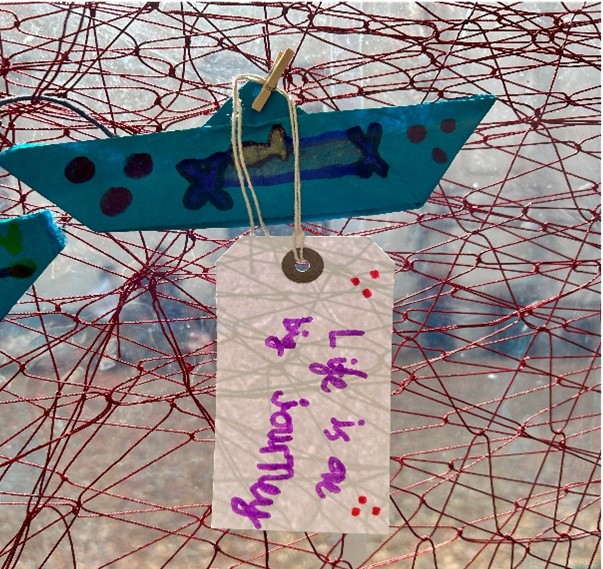
Along with giving our audiences something powerful to engage with, our decision was also governed by what we could make happen practically. The day before the event we were able to put the netting up and add a few paper boats that Suman had already made, ready for the installation to grow throughout the workshop and also during the week-long event.
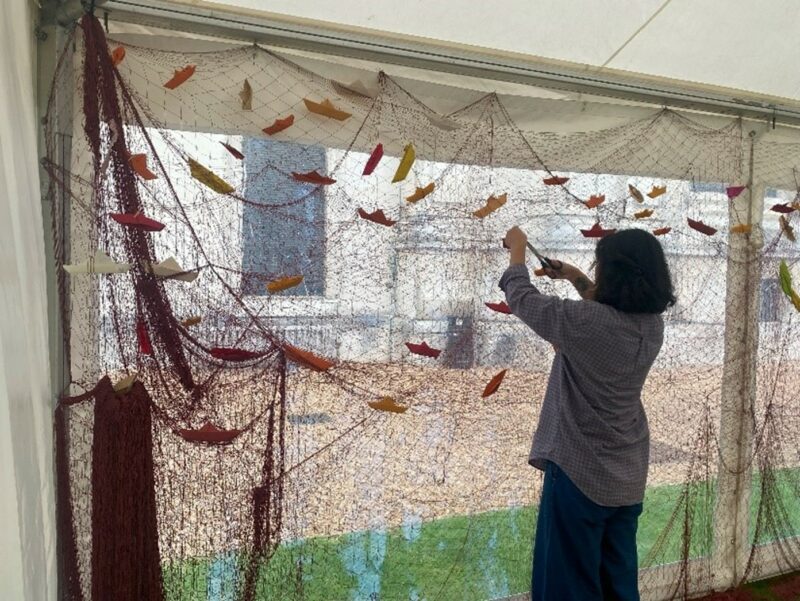
The day of the event
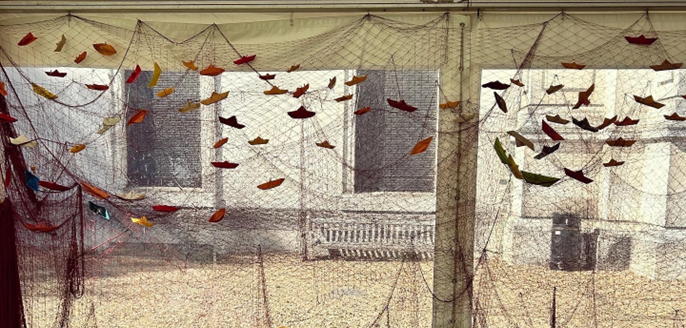
On the day of the event we had around 80 pre-booked visitors joining in with the installation, making origami paper boats, sending messages and comments, and having conversations with Suman and other museum staff about themes of Power and Journeys. The Fitzwilliam Museum let the installation stay up all week during their family festival, so by the end of that time the installation was packed, and very colourful! It was lovely to see how people had embraced the ethos of the event and left such powerful and heart warming messages on the installation.
What were that standout moments for us?
Suman herself had this to say:
“What struck me most were the conversations during the activity.
Families took part together, with parents discussing their own histories with their children and also their responses to the current migration crisis. It felt like a real honour to be able to provide a starting point for such important conversations. One family had travelled from London and were in the middle of applying for asylum which underlined how important this topic is.
I was also struck by how everyone had a response to the theme. What I loved were the discussions between people who didn’t know each other but realised how much they had in common. It’s a tricky subject but everyone was listening with respect.
It was fun watching the families help each other make the boats! Lots of the older attendees said how nice it was to get the youngsters away from screens.
I also really enjoyed working with Jen and Ruchika. They worked hard to help me bring my idea to fruition. They listened really carefully and made lots of suggestions. I felt they put in 110% effort. The Fitz team were also excellent and it was great that they joined in with the activity”.
Jenny Bull, Engagement Coordinator at the University of Cambridge Museums commented:
“For me it was standing [in the installation] at the end of the day and taking in all of the messages, thoughts and prayers that the participants had added to the boats they had made. They were messages of solidarity, hope and kindness, advocating for freedom of movement, and the freedom to stay. I was also struck by how Suman’s idea had prompted all of this”.
